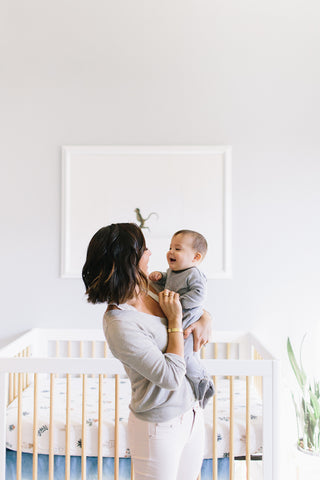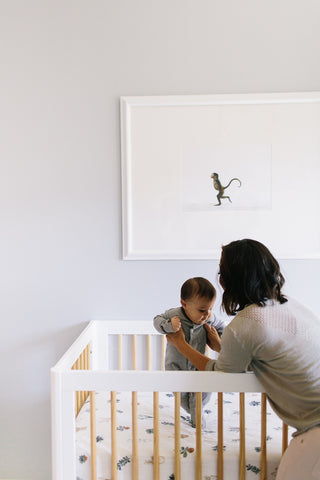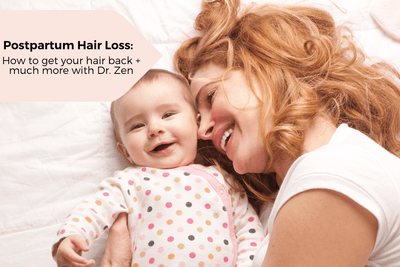Just when you’re getting a hold of this whole “new mom” thing, you catch a glance in the mirror of a balding patch around your temples or maybe a scary thick handful of hair falls in your hand in the shower.
Can’t moms catch a break?!
As a naturopathic doctor and the founder of NMD Wellness of Scottsdale, I want to first tell you that frustration or feeling sad / anxious about postpartum hair loss is totally normal. It can feel extremely overwhelming and often, we don’t want to talk about, in fears of sounding superficial or vain.
But let me be the first to tell you, worrying about postpartum hair loss IS NOT superficial or vain. In fact, a woman's hair is often part of their identity and just when you feel like motherhood has completely taken over everything you used to know, it can be hard to see just one more thing change.
But mamas, have no fear, Dr. Zen is here with my specific women’s health and hormone experience. I can answer your most frequently asked questions about postpartum hair loss to empower you with solutions.
Allyson's Postpartum Hair Loss Story
What is Postpartum Hair Loss?
Postpartum hair loss (also known as Telogen effluvium) is a normal and temporary process. It isn’t because the hair suddenly starts to fall, but because high levels of circulating estrogen produced by the placenta during pregnancy. This high level of estrogen causes hair follicles to remain in their active (anagen) phase of growth for a longer period of time.
Unfortunately, once you deliver your beautiful baby, your body will experience a dramatic decrease in circulating estrogen. This dramatic decrease causes the hair follicles that were previously in a prolonged growing phase to enter the next phase of the hair cycle known as the telogen phase.
The telogen phase leads to hair shedding and is why many women will say they felt like their postpartum hair loss came on all of a sudden.
All of sudden those prolonged hair follicles will actively shed.
When Does Postpartum Hair Loss Start & When Does It End?
Hair loss typically happens between two and five months postpartum (Source). It can come on suddenly and you may feel like you’ve left a small animal in the shower! The hair loss can also feel significant because you actually do have more hair on your head. By 12 months postpartum, your hair should be getting back to normal. The exact time will depend on your hair’s own unique lifecycle. The most common regrowth phase takes about 3 months.
Does Every New Mom Experience Postpartum Hair Loss?
No, but two and five months 40-50% of all new moms will experience some form of hair loss postpartum according to the American Pregnancy Association (Source).
The severity of hair loss can vary and is influenced by a variety of factors including genetics, age, nutrient status, hormones, and pre-existing conditions. Most women who experience postpartum hair loss will notice thinning of their hair, especially around their temples, a few weeks to months postpartum.

.
Is it Normal To Experience Hair Loss After a Miscarriage?
Yes, it’s absolutely normal for some women to experience postpartum hair loss after a miscarriage. Even a miscarriage during the first trimester can have an effect on your hair for the same body/hormone change reasons.
Does Breastfeeding Affect Postpartum Hair Loss?
It’s a common myth that breastfeeding causes hair loss postpartum, however, the two are unrelated. Breastfeeding will not make hair loss better or worse since the hormone changes in both are different.
.
How Much Hair Loss is Normal?
In general, you will shed anywhere between 50-100 strands of hair per day. This is a normal part of the hair life cycle and is a key way to make room for new hair growth.
Prior to pregnancy, about 84% of your hair follicles are in the active (anagen) phase at once while only about 10-15% are in the active shedding (telogen) phase.
After delivering a baby, roughly about 30% of your hair will be in the active shedding (telogen) phase.
This is why you may experience more hair shedding than ever before.
How Long Does Postpartum Hair Loss Last?
Generally speaking, it can last between 3-6 months. And when we say “last”, we mean hair actively shedding or thinning. At around the 12-month mark, you should see noticeable changes as your hair should be returning to its state pre-pregnancy.
However, I’ve found there is no guarantee that hair will return to its pre-pregnancy state, even if it mostly grows back. That’s why I recommend my clients use either a complete postnatal multivitamin, hair care, or growth serum to combat hair loss after having a baby.
Can You Prevent Postpartum Hair Loss?
Yes! Although delivering a child will always lead to a dramatic decrease in estrogen, there are a few key factors that can influence the severity of your hair loss.
Some of these factors include nutrient status, toxin exposure and pre-existing conditions. So, although postpartum hair loss can’t be completely avoided, it can be dramatically decreased by optimizing your nutrition and reducing your exposure to unnecessary toxins.
By making your nutrition a priority, you can reduce your postpartum hair loss and provide your entire body with key nutrients your body desperately needs postpartum.
1. Eat Your Fruits, Veggies & ProteinsGiving your body plenty of nutrients and protein is important for hair growth at any stage of life. Postpartum is one phase that it’s certainly harder to eat well, and when you can, your hair will thank you! If you want to make it easier to get in important nutrients and protein, try the Majka Lactation Protein Powder.2. Stay on a Prenatal Vitamin
3. Try a New Hair CutThere’s a reason why many new moms get a shorter style that doesn’t only lower maintenance but also works with the hair they have postpartum. If you’re expecting hair loss to hit on the average timeline, you may not want to cut your hair before three months postpartum. 4. Avoid Hot Styling Tools and Over-Washing Your HairThings that damage your hair, like hot styling tools and hair dye, may make postpartum hair loss worse or more noticeable. Try washing your hair less frequently, with a good quality shampoo. There isn’t one shampoo for postpartum hair loss but over-washing can damage your hair more. Your hair may take a few weeks to adjust to a new washing schedule but washing your hair once or twice a week is supposed to be best for hair health. (washing your hair less often usually isn’t hard to do as a new mom either!) 5. Consider A Postnatal MultivitaminMajla Nourishing Lactation Protein Powder is the first supplement designed by experts specifically with the needs of postpartum moms in mind. It targets common nutritional deficiencies (like folate, vitamin D, Iron & B vitamins) that occur postpartum and that are often carried from pregnancy. It also contains adaptogens to support the stress response which can contribute to hair loss and it also has powerful herbs that nourish the blood and bring circulation to the hair follicles to feed and strengthen them.
|
What Nutrients Can Help Prevent Postpartum Hair Loss?
Some of the most important nutrients to help prevent or reduce postpartum hair loss include protein, collagen, vitamins B, E, A, D, and C, as well as omega-3 fatty acids.
1. ProteinEvery cell in your body is made from protein, including hair! Have a source of protein each time you eat. If you're not a huge breakfast person, try having a protein smoothie in the late morning to ensure you get your protein in for the morning!
2. Collagen & VitaminTaking vitamin C helps promote the production of collagen in your body. Collagen is a beauty superfood, helping hair, skin & nails have more vitality
3. B & E VitaminsB vitamins help with stress, which is also a proposed factor in postpartum hair loss. Both B and E vitamins are especially beneficial in protecting and strengthening the hair at a cellular level.
4. Omega-3 Fatty Acids
I also recommend high quality omega-3 intake, in foods like wild caught salmon or fish oil extract, as they contain docosahexaenoic acid, an omega-3 fatty acid essential in hair growth.

Could My Hair Loss Be More Than Just Postpartum Hair Loss?
Yes, absolutely! I always recommend meeting with your doctor 2-3 months postpartum and asking for annual blood work.
This has become a complete game changer for many of my new moms. By doing blood work 2-3 months postpartum, it can allow us to monitor and diagnose many conditions in a preventative fashion.
One of the most common conditions I diagnose postpartum is thyroid disease. 1 in 8 women will develop a thyroid disease in their lifetime. Since thyroid disease can often present with hair loss, it can often go undiagnosed for months in many new moms.
When Does Postpartum Hair Loss Stop?
Most women experience postpartum hair loss 6 weeks -3 months postpartum. Most will notice their hair thinning and/or shedding stop around 3-6 months. That being said, it can take an additional 3-6 months for hair to grow back, and even then it might not return to normal.
No need to fear, mama. There are things you can start doing now to prevent hair loss, and even regrow your hair after having your baby.
Should I Talk to My Doctor About My Hair Loss?
If you feel like it's abnormal, YES!
I always remind my patients that they’re the ones in their bodies every single day and if something doesn’t feel right, it’s time we address it.
If you’ve been experiencing postpartum hair loss for more than 6 months or haven’t noticed the start of any new hair growth, it’s time to talk to your doctor.
Too often, I have new moms who felt vain about asking about their hair, when in fact, their hair loss was actually a subtle sign of a bigger issue.
The sooner we can address the underlying cause, the faster we can get your hair back.
Majka Nourishing Lactation Protein Powder for Postpartum Hair Loss
We know postpartum hair loss is one of the most common yet traumatic postpartum experiences for new moms. Majka Nourishing Lactation Protein Powder has over 50 vitamins and nutrients and is the MOST complete and clean lactation powder in the market today.
It targets common nutritional deficiencies (like folate, calcium, vitamin D, B vitamins, lodine) that occur postpartum and that are often carried from pregnancy.
It also contains pre & probiotics, digestive enzymes and adaptogens to support the stress response which can contribute to hair loss and it also has powerful herbs that nourish the blood and bring circulation to the hair follicles to feed and strengthen them.
Benefits of Majka Nourishing Lactation Protein Powder for hair:
- Stronger and healthier hair
- Improve hair condition and promotes length
- Improved hair thickness
- Less shedding and generates growth
- All ingredients also help improve your skin and nails, an extra benefit!
Majka Nourishing Lactation Powder Against the Competition
We not only want you to be well nourished in motherhood on the inside but to feel confident and beautiful on the outside, too.
Motherhood is hard! Are you looking for more tips? Check out our Time Management Tips for New Moms if you’re feeling overwhelmed with your list of to-do’s and How Can Stress Impact Breastfeeding if you need tips on dealing with stress as a new mom!
.
References:
American Pregnancy Association Online. Hair Loss During Pregnancy.
Eastham JH. Postpartum alopecia. Ann Pharmacother. 2001 Feb;35(2):255-8.
Lynfield YL. Effect of Pregnancy on the Human Hair Cycle. The Journal of Investigative Dermatology (1960) 35, 323–327; doi:10.1038/jid.1960.127
---------------------------------------------------------------------------------------------
 Dr. Alissia Zenhausern, NMD (or Dr. Zen for short) is a licensed naturopathic doctor and the founder of NMD Wellness of Scottsdale. She focuses on helping women get back into the driver's seat of their own health. She believes in helping educate, inspire and empower women to better understand their hormones and fertility, so they can make decisions that are right for them. From preconception counseling, PCOS, fertility and postpartum care, Dr. Zen helps women have a voice in their own health. She has been featured as a lead expert in wellness in Instyle Magazine, Shape and Forbes and truly believes in empowering women to optimize their health naturally.
Dr. Alissia Zenhausern, NMD (or Dr. Zen for short) is a licensed naturopathic doctor and the founder of NMD Wellness of Scottsdale. She focuses on helping women get back into the driver's seat of their own health. She believes in helping educate, inspire and empower women to better understand their hormones and fertility, so they can make decisions that are right for them. From preconception counseling, PCOS, fertility and postpartum care, Dr. Zen helps women have a voice in their own health. She has been featured as a lead expert in wellness in Instyle Magazine, Shape and Forbes and truly believes in empowering women to optimize their health naturally.
.
.



